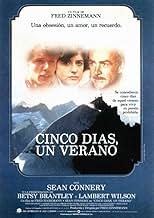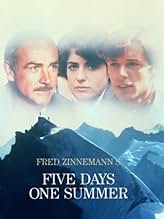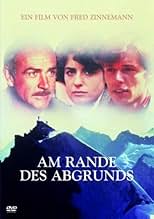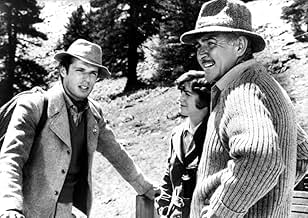VALUTAZIONE IMDb
6,1/10
1390
LA TUA VALUTAZIONE
L'intrigante storia di un incestuoso amore con il magnifico sfondo delle Alpi svizzere.L'intrigante storia di un incestuoso amore con il magnifico sfondo delle Alpi svizzere.L'intrigante storia di un incestuoso amore con il magnifico sfondo delle Alpi svizzere.
Jerry Brouer
- Van Royen
- (as Jerry Brouwer)
Recensioni in evidenza
Psychological melodrama goes a bit far combining the story of a complex and dubious love relationship with the thrills of dangerous mountaineering, but is mildly entertaining, if you can bear it.
10patjam
A cinemagraphic masterpiece where all the relationships and tensions developed by the story (a tale of irrepressible love fulfilled, thwarted and betrayed) are conveyed in the exquisitely rendered images carrying the communications that you read as if they were a text; and with the verbal dialogue reduced to the barest minimum required.
I'm one of those who think this film is a neglected gem.
It has a number of twists but it is the interaction between the three leads that makes it so compelling. Without giving too much away, the story, which is set in 1932, is about a couple, Douglas Meredith (Sean Connery) and the much younger Kate Meredith (Betsy Brantley) who arrive at a Swiss chalet during the summer for some hiking and a little mountain climbing.
As the story unfolds we realise that although they introduce themselves as husband and wife, there is something difficult about the relationship. The whole thing comes to a head and decisions are forced when Kate attracts the attention of a young climbing guide played by Lambert Wilson.
This was Fred Zinneman's last film, but it has a different mood and pace than many of his films. It unfolds at not so much a leisured pace but a measured one, and there is plenty of tension throughout the story. It seems very much like a Merchant Ivory production. If you have seen films such as "Heat and Dust", "Howard's End" or "Remains of the Day", you'll know what I mean - although it was made a few years before any of those.
Apparently the film bombed when it was first released and the critics were less than impressed. Possibly that was partly because it was an unexpected entry from the man who had helmed films such as "From Here to Eternity", "High Noon" and "The Day of the Jackal", but I think they may also have been put off by the revelation about the Meredith's relationship.
Sean Connery plays a man with much on his mind with no small amount of guilt thrown in. He handles it with the same understatement that underpins the film. Surprisingly, Connery's natural power comes through more noticeably here than in many of his action roles.
With her rather unflattering 1930's fashions and bobbed hairstyle, Betsy Brantley at first seems unprepossessing as Kate but her openness and freshness soon makes believable the attention she receives from the males in the movie.
If you're tastes run to "Fast and Furious 4" then this probably isn't your movie, but if you are looking for a beautifully acted and photographed story with a touch of intrigue told in an unhurried manner, "Five Days in Summer" is worth seeking out.
It has a number of twists but it is the interaction between the three leads that makes it so compelling. Without giving too much away, the story, which is set in 1932, is about a couple, Douglas Meredith (Sean Connery) and the much younger Kate Meredith (Betsy Brantley) who arrive at a Swiss chalet during the summer for some hiking and a little mountain climbing.
As the story unfolds we realise that although they introduce themselves as husband and wife, there is something difficult about the relationship. The whole thing comes to a head and decisions are forced when Kate attracts the attention of a young climbing guide played by Lambert Wilson.
This was Fred Zinneman's last film, but it has a different mood and pace than many of his films. It unfolds at not so much a leisured pace but a measured one, and there is plenty of tension throughout the story. It seems very much like a Merchant Ivory production. If you have seen films such as "Heat and Dust", "Howard's End" or "Remains of the Day", you'll know what I mean - although it was made a few years before any of those.
Apparently the film bombed when it was first released and the critics were less than impressed. Possibly that was partly because it was an unexpected entry from the man who had helmed films such as "From Here to Eternity", "High Noon" and "The Day of the Jackal", but I think they may also have been put off by the revelation about the Meredith's relationship.
Sean Connery plays a man with much on his mind with no small amount of guilt thrown in. He handles it with the same understatement that underpins the film. Surprisingly, Connery's natural power comes through more noticeably here than in many of his action roles.
With her rather unflattering 1930's fashions and bobbed hairstyle, Betsy Brantley at first seems unprepossessing as Kate but her openness and freshness soon makes believable the attention she receives from the males in the movie.
If you're tastes run to "Fast and Furious 4" then this probably isn't your movie, but if you are looking for a beautifully acted and photographed story with a touch of intrigue told in an unhurried manner, "Five Days in Summer" is worth seeking out.
This final Fred Zinnemann film was pretty much trashed by the critics when it came out in 1983 which is puzzling, in my opinion. I mean, it's certainly not a great or even very good film but it's just as good or better than a lot of the stuff DePalma was churning out at the same time over which the same critics swooned. Of course, by 1983 Zinnemann was long out of favor with the auteurists who dominated film criticism, having been consigned to the realm of "impersonality" by their hero and mentor, Andrew Sarris who, as usual, confused moral earnestness and craftsmanship with anonymity, as if Zinnemann were no better than, say, Robert Z. Leonard. Or Delbert Mann.
So let me do my small part to mildly rehabilitate this sad tale of a love affair crumbling amid the Alps that could have been told by Hemingway, Irwin Shaw or James Salter. Problem is that scenarist Michael Austin is considerably less talented than those three scribes and makes the fatal mistake, I'm sure with Zinnemann's input, of having the affair be between uncle and niece, thus giving the proceedings an un-needed "yuck!" factor when the story could have worked just as easily or better as older man/younger woman.
If, however, you can overlook the above failing (a tall ask, judging by the IMDB responses below) there are many things that are appealing in this good director's swan song, including fine performances by the three leads, especially the too seldom seen Betsy Brantley who imbues her character with poignancy, intelligence and grace. I also liked the story within the story of the old woman who gazes upon the perfectly ice-preserved body of the handsome young man she was to marry forty years ago. A lot of film makers would have stuck this in awkwardly as a clunky, moralistic sub plot. Not Zinnemann. In his hands it is woven seamlessly into the movie's fabric and does not hit you over the head with "message" about true versus false love.
Then there is the lovely score by Elmer Bernstein, and the even lovelier cinematography of Giuseppe Rotunno.
Bottom line: Sarris was wrong about Huston and Wilder. I maintain he's almost as wrong about Zinnemann. Give it a B minus.
So let me do my small part to mildly rehabilitate this sad tale of a love affair crumbling amid the Alps that could have been told by Hemingway, Irwin Shaw or James Salter. Problem is that scenarist Michael Austin is considerably less talented than those three scribes and makes the fatal mistake, I'm sure with Zinnemann's input, of having the affair be between uncle and niece, thus giving the proceedings an un-needed "yuck!" factor when the story could have worked just as easily or better as older man/younger woman.
If, however, you can overlook the above failing (a tall ask, judging by the IMDB responses below) there are many things that are appealing in this good director's swan song, including fine performances by the three leads, especially the too seldom seen Betsy Brantley who imbues her character with poignancy, intelligence and grace. I also liked the story within the story of the old woman who gazes upon the perfectly ice-preserved body of the handsome young man she was to marry forty years ago. A lot of film makers would have stuck this in awkwardly as a clunky, moralistic sub plot. Not Zinnemann. In his hands it is woven seamlessly into the movie's fabric and does not hit you over the head with "message" about true versus false love.
Then there is the lovely score by Elmer Bernstein, and the even lovelier cinematography of Giuseppe Rotunno.
Bottom line: Sarris was wrong about Huston and Wilder. I maintain he's almost as wrong about Zinnemann. Give it a B minus.
This movie is dated and overly dramatic, but it also has its charms. The best part about it is the accurate portrayal of Swiss culture (yeah it does kind of exist, mostly mountain climbing and rigid traditions, but the occasional alphorn and yodle). Really, it is frighteningly accurate. Beautiful mountain scenery and discovering how old-school climbing gear worked are two of the other benefits of this surprisingly sweet movie.
Lo sapevi?
- QuizSir Sean Connery once described this movie's location work as "the most audacious piece of filmmaking I've ever been involved in. It was film production at the point of pioneering." Connery once recounted the worst moment he experienced while making this movie. Connery had to make a three hundred meter (three hundred twenty-eight yard) walk alone down a glacier known to be laden with crevasses hidden by a fresh snowfall and without safety markers. The marker poles were present during rehearsals, but were not there during filming, as they would be seen in the shot. Connery said, "Inches on either side of the path there were ninety foot caverns. I could hear the sound of ice moving underneath me, and behind me in the peaks, shifting all the time. That's the loneliest walk I've ever taken."
- Versioni alternativeFred Zinnemann edited 11 minutes from this film for its 1987 CBS television network premiere.
- ConnessioniReferenced in Re per una notte (1982)
- Colonne sonoreAlexander's Ragtime Band
Composed by Irving Berlin
I più visti
Accedi per valutare e creare un elenco di titoli salvati per ottenere consigli personalizzati
- How long is Five Days One Summer?Powered by Alexa
Dettagli
- Data di uscita
- Paese di origine
- Sito ufficiale
- Lingue
- Celebre anche come
- Five Days One Summer
- Luoghi delle riprese
- Aziende produttrici
- Vedi altri crediti dell’azienda su IMDbPro
Botteghino
- Budget
- 17.000.000 USD (previsto)
- Lordo Stati Uniti e Canada
- 199.078 USD
- Fine settimana di apertura Stati Uniti e Canada
- 43.891 USD
- 14 nov 1982
- Lordo in tutto il mondo
- 199.078 USD
Contribuisci a questa pagina
Suggerisci una modifica o aggiungi i contenuti mancanti

Divario superiore
By what name was Cinque giorni una estate (1982) officially released in Canada in English?
Rispondi































